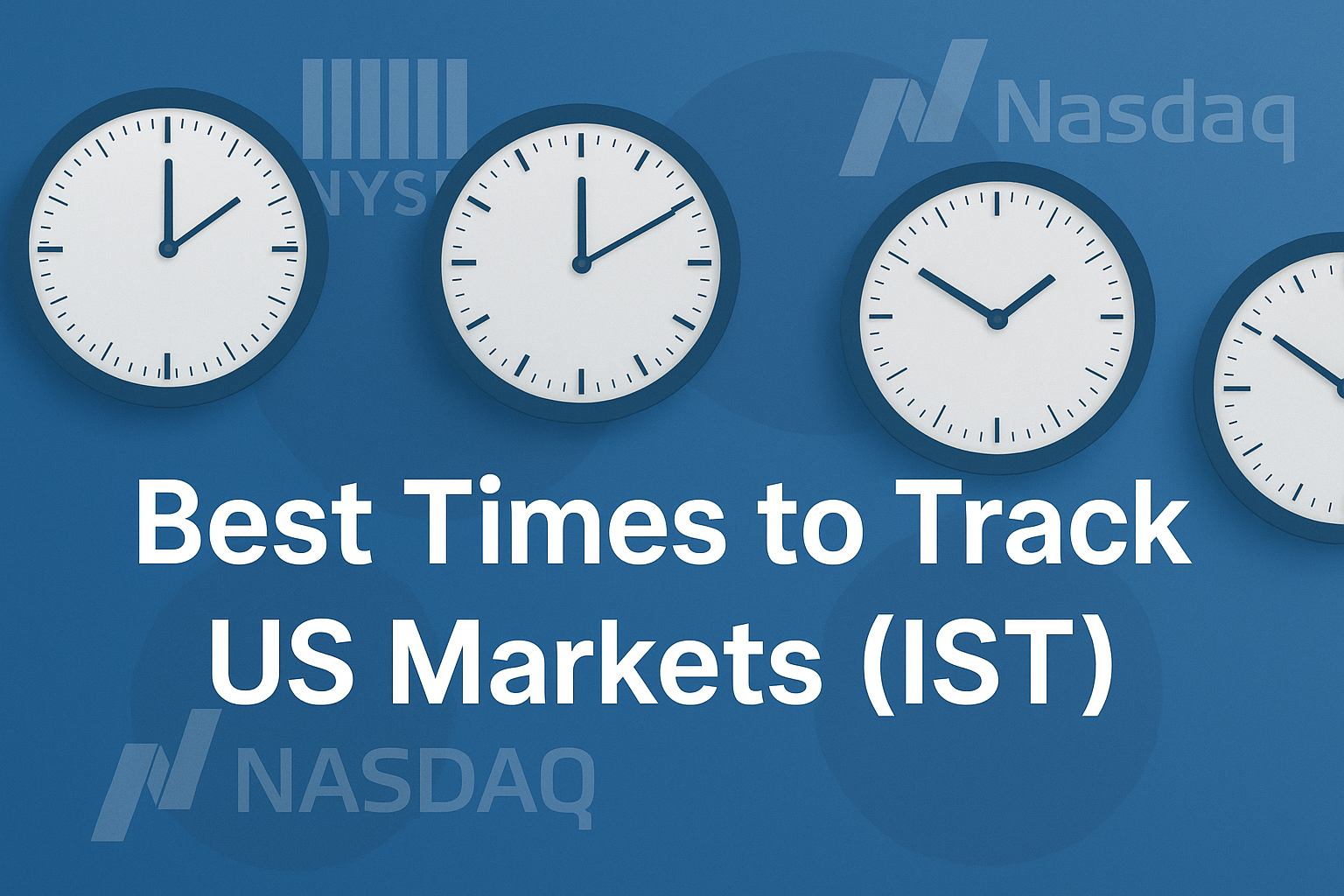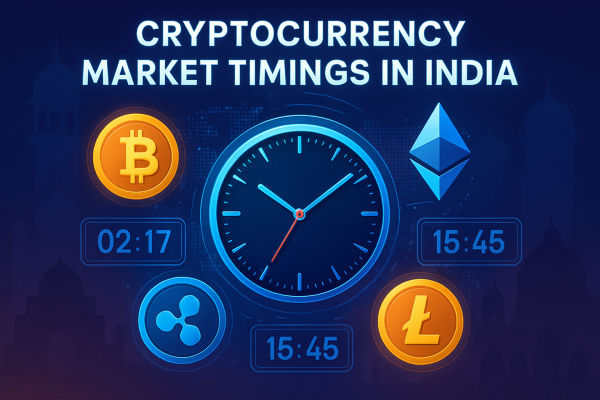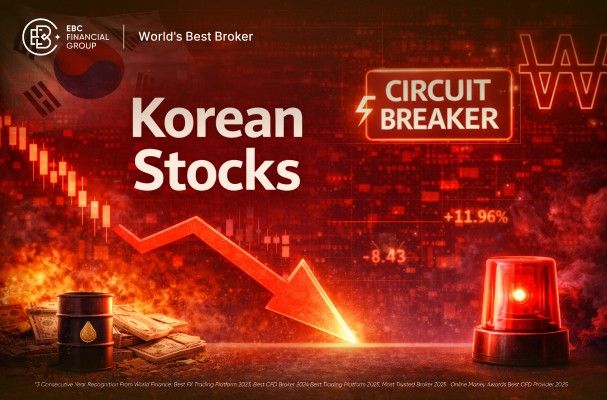One of the most common questions among Indian investors and traders is: "When does the US stock market open in India time?"
The answer for 2025 depends on whether the US is on Daylight Saving Time (DST) or Standard Time.
During DST (March–November): The New York Stock Exchange (NYSE) and NASDAQ open at 7:00 PM IST and close at 1:30 AM IST (next day).
During Standard Time (November–March): They open at 8:00 PM IST and close at 2:30 AM IST (next day).
India does not implement daylight saving time, so the variation is solely due to the US altering its clocks. This timing is significant for Indian investors monitoring US stocks, forex, commodities, or worldwide indices.
When US Market Open in India Time (IST)? Complete Guide 2025
| Session |
US Time (ET) |
India Time (IST, DST) |
India Time (IST, Non-DST) |
| Regular Trading Hours |
9:30 AM to 4:00 PM |
7:00 PM to 1:30 AM |
8:00 PM to 2:30 AM |
| Pre-Market |
4:00 AM to 9:30 AM |
1:30 PM to 7:00 PM |
2:30 PM to 8:00 PM |
| After-Hours |
4:00 PM to 8:00 PM |
1:30 AM to 5:30 AM |
2:30 AM to 6:30 AM |
Both the NYSE and NASDAQ operate on the same trading schedule.
Best Times for Indian Traders to Track US Markets in 2025

While the US market trades from 7:00 PM to 1:30 AM IST (during DST), Indian investors don't always need to stay awake all night. The most crucial windows are:
Opening Hour (7:00 PM to 8:00 PM IST / 8:00 PM to 9:00 PM IST in Non-DST): High volatility as global institutions react to news.
Closing Hour (12:30 AM to 1:30 AM IST / 1:30 AM to 2:30 AM IST): Often dictates next-day sentiment in Asian markets.
Earnings Announcements (5:30 PM to 7:00 PM IST / 1:30 AM to 3:30 AM IST): Pre- and post-market results of big companies.
Why US Market Hours Matter for Indian Investors
1) Impact on Indian Stock Market (NSE/BSE):
Wall Street moves often spill over into Nifty and Sensex through global investor sentiment.
2) Global Companies and Tech Giants:
Indians investing in US stocks (directly, via global brokers, or through ETFs like Nasdaq 100 funds) must track US market hours.
3) Forex and Commodity Traders:
The US Dollar Index (DXY), gold, and crude oil often react sharply during US hours, impacting INR-based trades.
4) Indian ADRs Listed in the US:
Companies such as Infosys, Wipro, ICICI Bank, and HDFC Bank are listed on the NYSE/NASDAQ. Their US performance can influence domestic sentiment.
5) Mutual Funds and ETFs Exposure:
Even if you don't directly trade US stocks, Indian mutual funds and ETFs with US exposure rely on movements in the US market.
Major US Market Holidays in 2025 (IST Adjusted)
| Holiday |
Date (2025) |
Day |
Market Status |
| New Year's Day |
Jan 1 |
Wed |
Closed |
| Martin Luther King Jr. Day |
Jan 20 |
Mon |
Closed |
| Presidents’ Day |
Feb 17 |
Mon |
Closed |
| Good Friday |
Apr 18 |
Fri |
Closed |
| Memorial Day |
May 26 |
Mon |
Closed |
| Juneteenth National Independence Day |
Jun 19 |
Thu |
Closed |
| Independence Day |
Jul 4 |
Fri |
Closed |
| Labor Day |
Sep 1 |
Mon |
Closed |
| Thanksgiving Day |
Nov 27 |
Thu |
Closed |
| Christmas Day |
Dec 25 |
Thu |
Closed |
On these dates, Indian investors will see no movement in US indices such as the Dow Jones, S&P 500, and NASDAQ. Moreover, we have bolded the upcoming holidays.
Frequently Asked Questions
1. What Time Does the US Stock Market Open and Close in India?
During DST (Mar–Nov): 7:00 PM – 1:30 AM IST. During Standard Time (Nov–Mar): 8:00 PM – 2:30 AM IST.
2. What Is the Best Time to Follow the US Markets From India?
The most critical hours are the first hour after opening (7 PM to 8 PM IST) and the last hour before closing (12:30 AM to 1:30 AM IST).
3. Do Pre-Market and After-Hours Affect Stock Prices?
Yes. Earnings reports and macro announcements often move stocks sharply outside regular hours.
4. Do US Market Holidays Affect Indian Stock Markets?
Indirectly, yes. If US markets are closed, global liquidity and volatility reduce, which can keep Indian markets rangebound.
Conclusion
For Indian investors, knowing US stock market hours in IST is not just about tracking Wall Street; it's about anticipating how global moves ripple into Nifty, Sensex, forex, and commodities.
By focusing on the opening, closing, and earnings announcement windows, investors can align strategies, manage risks, and enhance global trading choices.
Disclaimer: This material is for general information purposes only and is not intended as (and should not be considered to be) financial, investment or other advice on which reliance should be placed. No opinion given in the material constitutes a recommendation by EBC or the author that any particular investment, security, transaction or investment strategy is suitable for any specific person.


























